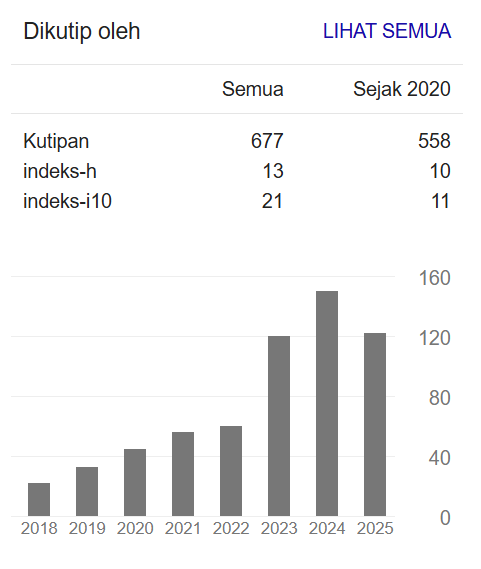FALSAFAH WŪJŪDIYYAH DALAM RELASI PEMIKIRAN HAMZAH FANSURI DAN MULLĀ ṢADRĀ
DOI:
https://doi.org/10.20871/kpjipm.v8i1.178Keywords:
Mumkin al-Wūjūd, Philosophy, Wājib al-Wūjūd, Wūjūd, WūjūdiyyahAbstract
This paper is a literature review of the thoughts of Mullā Ṣadrā and Hamzah Fansuri regarding the philosophical discourse of embodiment which is considered to have a relationship in the discourse of Islamic philosophy and the archipelago. This paper aims to read and explain the philosophical relation of the embodiment of Hamzah Fansuri and Mullā Ṣadrā as models of Nusantara and Islamic thought which are seen as having a relationship or similarity. By using a descriptive analysis approach, it is concluded that being in the view of Hamzah Fansuri and Mullā Ṣadrā is seen as a source of existence that is one in diversity. One source of existence is understood as existence that presents various entities outside of itself. Mullā Ṣadrā and Hamzah Fansuri understand that the universe consists of a series of causes and effects that imply the diversity of existence in reality. The diversity of existence comes from the main cause called Wājib al-Wūjūd which describes existence as the source of one being in diversity. The result of this paper is to read the urgency of Hamzah Fansuri's and Mullā Ṣadrā's philosophy of being who is seen as having a relationship or similarity in philosophical civilization, as well as tracing the interaction of the discourses of Nusantara and Islamic thought.
Downloads
References
Akbarian, Reza. 1999. Trans-Substantial Motion and Its Philosophical Consequences. Tehran: SPRIn.
Allaf, Mashhad Al. 2006. The Essensial Ideas of Islamic Philosophy. USA: The Edwin Mellen Press.
Attas, Syed Muhammad Naquib Al-. 1970. The Mysticism of Hamzah Fansuri. Kuala Lumpur: University of Malay Press.
Eshots, Yanis. 2010. “Substantial Motion and New Creation in Comparative Context.” Journal of Islamic Philosophy 6.
———. 2007. Mullā Sadrā’s Teaching on Wujūd: A Synthesis of Mysticism and Philosophy. Tallinn: Tallinn University.
Gazo, Ernest Wolf. 1999. The Tranformation of Substance in Whitehead and Sadrā. Tehran: SIPRIn Publication.
Gharawiyan, Mohsen. 2012. Pengantar Memahami Buku Daras Filsafat Islam. Jakarta: Sadra Press.
Haidari, Kamal. 1427. Durūs fi Al-Ḥikmah Muta’āliyah: Sharah Kitāb Bidāyah Al-Ḥikmah. Qom: Mu’assasah Al-Imām Al-Jūlūh Al-Fikr Al-Thaqāfah.
Hamid, Abu. 1994. Syeikh Yusuf Al-Makassari, Seorang Ulama, Sufi, dan Pejuang. Jakarta: Yayasan Obor Indonesia.
Haq, Muhammad Abdul. 2013. Mullā Ṣadrā’s Concept of Subtantial Motion. Islamabad: Islamic Research Institute.
Kalbīkānī, Ali Rabbānī. 1998. Īdhāhu Al-Ḥikmah fi Sharah Bidāyah Al-Ḥikmah. Beirut: Dār Al-Tiyār Al-Jadīd.
Kalin, Ibrahim. 2000. “Knowledge as the Unity of the Intellect and the Object of Intellection in Islamic Philosophy: A Historical Survey from Plato to Mulla Sadra.” Transcendent Philosophy: An International Journal for Comparative Philosophy and Mysticism 1 (1): 73-91.
Kamal, Muhammad. 2005. Mulla Sadra’s. Aldershot: Ashgate Publishing Limited.
———. 2009. “Rethinking Being: From Suhravardi to Mulla Sadra.” Victoria: Journal of Shi’a Islamic Studies 2.
Khadimi, Ayatullah. 1999. Mulla Sadra’s Illuminationist and Mystical Ideas Concerning the Origination of the Many (Kathīr) from the One (wahīd). Tehran: SIPRIn, 1999.
Khamenei, Muhammad. 2004. Mulla Sadra’s Trancendent Philosophy. Tehran: SIPRIn.
Miswari, Miswari. 2014. “Hamzah Fansuri dan Pemikiran Wahdat Al-Wujud dalam Asrar Al-‘Arifin.” Tesis, Jakarta: ICAS-Paramadina.
———. 2015. Pesan Syair Hamzah Fansuri. Langsa: The Nusantara Institute.
———. 2018. Wahdah Al-Wujud; Konsep Kesatuan Wujud Antara Hamba dan Tuhan Menurut Hamzah Fansuri. Yogyakarta: Basabasi.
Munawir, Ahmad Warson Al. 1997. Al-Munawir: Kamus Arab-Indonesia. Yogyakarta: Pustaka Progresif.
Muthari, Abdul Hadi Wiji. t.t. Hamzah Fansuri Penyair Sufi Aceh. Jakarta: Lotkala.
Nur, Muhammad. 2012. Wahdatul Wujud Ibn ‘Arabi dan Filsafat Wujud Mulla Sadra. Makassar: Chamran Press.
Nur, Syaifan. 2003. Filsafat Wujud Mulla Sadra. Bandung: Teraju.
Rahman, Fazlur. 2000. Filsafat Shadra. Bandung: Pustaka.
Ramin, Farah. 1999. Mulla Sadra and Transcendent: The Principles of Mulla Sadra’s Philosophy. Tehran: SPRIn.
Rizvi, Sajjad H. 2009. Mulla Sadra and Metaphysics. London: Routledge.
Ṣadrā, Mullā. 2002. Al-Ḥikmah Al-Muta‘ālīyah fī Al-Asfār Al-‘Aqliyah Al-’Arba‘Ah. Beirut: Dār Al-Ehia Al-Taurath Al-‘Arabi.
Sheikh, M. Seed. 1980. Islamic Philosophy. London: Octagon Press.
Soleh, Khudori. 2016. Filsafat Islam: Dari Klasik Hingga Kontemporer. Yogyakarta: Ar-Ruzz Media.
Thabathabāi, Husain. 1418. Bidāyah Al-Ḥikmah. Qom: Muassah Al-Mārif Al Islāmiyyah.
———.2000. Nihāyah Al-Hikmah. Qom: Muassah Al-Nasri Al-Islāmī.
———. 2011. Uṣūl Al-Falsafah. Beirut: Dār Al-Jawād Imam.
Walid, Kholid Al. 2005. “Epistemologi Mulla Shadra: Ittihād Al-Āqil Wa Al-Mā’qul.” Tesis, Bandung: UIN Sunan Gunung Djati.
Yazdi, Muhammad Taqi Misbah. 2010. Buku Daras Filsafat Islam: Orientasi ke Filsafat Islam Kontemporer. Jakarta: Shadra Press.
Downloads
Published
How to Cite
Issue
Section
License
Copyright (c) 2022 Kanz Philosophia A Journal for Islamic Philosophy and Mysticism

This work is licensed under a Creative Commons Attribution-NonCommercial-ShareAlike 4.0 International License.





























